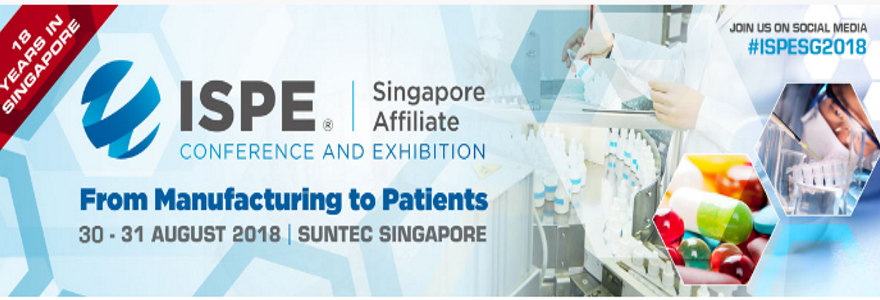Manufacturing within Singapore’s Pharmaceutical industry – what to look out for in 2019?

The pharmaceutical industry in Singapore have been achieving unprecedented growth on the back of robust Asia Pacific (APAC) regional demand and favourable demographics. The APAC region has far outpaced the United States and Europe – growth rate stands at 19.9%, well above the 10% growth rate recorded in the US and Europe.
To keep up with this fast-changing industry, our team partnered with International Society for Pharmaceutical Engineering (ISPE) 2018 last August, which gathered industry experts and specialists. It was a great platform for everyone to discover the outlook of the market ahead, as well as the upcoming state-of-the-art technology as innovation continue to support the growth of its manufacturing sector.
Chairperson of ISPE 2018, Pierre Winnepenninckx shared “As our industry experiences innovation, change and the constant need to stay ahead of the game, our accountability as an industry body also increases. Our approach to providing learning and business opportunities also needs to evolve.”
As such, what are some of the trends that organisations will need to take note of to stay ahead of the game? Below is an overview which will sum up pharmaceutical trends of 2018 that will have a significant impact on the industry in the coming years.
What were the key takeaways of 2018?
1. Growing impact of Pharma 4.0
The dawn of Pharma 4.0 has brought about a precedence of smart manufacturing with Artificial Intelligence (AI), Internet of Things (IoT) and automation. Such technologies are increasingly prevalent and have become essential to the continued success and competitiveness of today’s global pharmaceuticals.
David Staunton, Director of Global Services at Zenith Technologies shared “Industry 4.0 is not just about Big Data, it’s about using your Data. Practical manufacturing examples highlights how data analysis have improved patient supply.”
Zenith Technologies, a tech firm powering patient health also released a whitepaper on ‘Industry 4.0: Revolutionising Life Science Manufacturing through connected systems and data’ which shared how the life science industry is reducing risk with the revolution of Pharma 4.0 – the new products, processes and services will be cheaper, faster, safer and of a higher quality than their predecessors. Currently, 77% of the respondents from Zenith’s survey said there would be an increase of investments towards headcount to ensure that organisations would be able to leverage on emerging technologies.
This is with the aim to create a more agile and flexible manufacturing team. This involves the ability to adopt highly-integrated control and information solutions for greater productivity, increased efficiency, and lowered risks.
Today’s automated, high-throughput screening allows scientists to access a huge amount of data with minimal manual interaction. This keeps costs low and increases the speed at which systems can analyse complex data sets such as gene sequences. With automation, even personalised medication would be able to reach their full potential as they can be catered to each patient’s needs. Automation and around-the-clock processing allows for commercial viability of drugs. Without automation and robotics, scientists are often hampered by manual testing procedures.
2. Cultivating data integrity
Ensuring data integrity proactively at every stage of the pharmaceutical product lifecycle is paramount for pharmaceutical industries. This is to maintain their reputation, competitive edge and financial stability, as well as the safety and trust of patients. Compliance failures have a long tail in an environment where risks and benefits are always in delicate balance.
Data Integrity in the Life Sciences market is crucial to the production and export of drugs and medical devices around the globe. Incomplete or inaccurate data can result in the FDA or other Governing Bodies classifying a facility as one that has a lack of control within processes resulting in the end product not being fit for consumption. For instance, a database with time-stamped data is essential as consistent time data makes every subsequent interpretation and decision simpler and more reliable. If we use the example of a temperature gauge in drug manufacturing – when an irregular temperature reading is given, the automated system will look for data around a previous event that mirrors the current one – it simply cannot do this if said data is not accurately time-stamped.
Thus, moving forward, pharmaceutical firms will need to constantly keep their systems up-to-date with the latest requirements and practices to enable robust data management.
3. Empowering women in pharma
Gender diversity has been a talk of the town and the pharma industry have been notably lagging behind in efforts.
As a result, this could deter future women to step up and pursue a career in STEM. Given the challenge of equipping growing teams in pharmaceuticals with a competitively small talent pool, firms will need to relook their hiring strategies.
Zuellig Pharma is currently doing so is by launching two key development programmes – young talent programme and advanced management programme. This is in hopes to ensure a mix of gender, nationality, business units, and functions in its organisation.
Apart from that, to maintain diversity in its workplaces, Zuellig Pharma also constantly reviews its hiring practices, people policies, and talent programmes to ensure it is set up to hire a diverse profile of people. The pharmas and healthcare providers are also continuing its efforts to ensure pay and bonus equity between genders and levels.
Nevertheless, the glass ceiling for female board directors has cracked but is not yet broken, and 2019 will be a year to see more improvement within the area.
The pharma industry in Singapore continues to undergo great changes and Real Life Sciences Singapore is gearing towards addressing your needs in the sector for the year ahead.
If you’d like to find out more, get connected with me for updates. You may also visit our website at www.realstaffing.com for more industry related insights.




